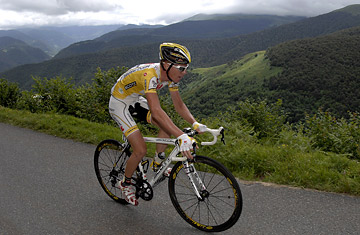
Cyclist Riccardo Riccò tested positive for EPO.
Following cycling is more and more like watching Shakespeare — or bad Reality TV. Rather than thrills and victories, the sport's struggle with doping now provides a predictable arc of seduction and betrayal. That was the storyline again Thursday, when the latest mountain-climbing matinee idol, Italy's Riccardo Riccò was hustled away from the Tour de France after testing positive for banned substances.
Like the proverbial woman-who-loves-bad-men, cycling fans are left asking themselves: How did I fall for another one?
Just four days after a spectacular win in the first major mountain stage of this year's Tour, the 24-year-old climbing specialist tested positive for the banned blood booster erythropoietin (EPO), French anti-doping agency officials told reporters. French police immediately took Riccò into custody, as the now familiar scene of chaos erupted, with photographers and name-calling fans swarming around his Saunier Duval team's yellow bus. The entire Spanish team subsequently pulled out of the competition before Thursday's start of stage 12.
Riccò, who in the past has denied any doping irregularities, is the third competitor to be forced out of the race this year under a cloud of performance-enhancing suspicion. But it is the Italian's exit that definitively stains the entire competition, as happened last year with the early exit of then Tour leader Michael Rasmussen of Denmark, and in 2006 when American Floyd Landis was stripped of his crown following the race.
The latest scandal at the top of cycling's flagship competition adds weight to the lingering question of whether doping poses a fatal threat to this most grueling of endurance sports. French television interviewed fans in the hills above the southern French town of Lavelanet after news of Riccò's drug ouster broke. "You have to expect it by now," said one father, holding his young son in his arms. "It's sad." After Rasmussen was sent home by his Rabobank team last year for refusing to answer questions about his training regimen, daily paper France Soir declared the "death of the Tour de France on July 25, 2007, at the age of 104".
There will no doubt be more such headlines in the coming days. The sport is built upon the emotion of watching someone do what Riccò did on Sunday. Two-thirds of the way through the torturous ninth stage, the rail-thin blond, who had emerged with a second-place finish in last month's Giro d'Italia, burst from the pack on the category-one Col d'Aspin ascent, blowing past opponents in a stunning display of power.
It is the pure physical toll of covering more than a hundred miles, day after day, for up to a month straight, that gives cycling much of its built-in drama. It is also what makes it so susceptible to the temptation of pharmaceutical assistance. Well-funded teams go to great lengths to enhance strength and endurance, through both legal and, in some cases, illegal means. Anti-doping officials try their best to keep up with the latest techniques for avoiding detection. This tension inevitably casts a shadow on the other top competitors who have not tested positive, both those who adamantly shun doping and those who have managed to beat the blood and urine tests.
Seven-time Tour champion Lance Armstrong, who was never accused by race officials of doping, has had to repeatedly fend off accusations from Irish and French journalists that he broke the rules. Armstrong, who steadfastly denies any wrongdoing, was credited with revitalizing the sport, but cycling has suffered since his retirement three years ago.
As he crossed the finish line atop the Pyrenees on Sunday, Riccò lifted his hands up from the handlebars, kissed his two index fingers and pointed three times to his own chest, as if to say, "It's me, I'm the one." Yes, you're the one who was about to break our hearts again.
